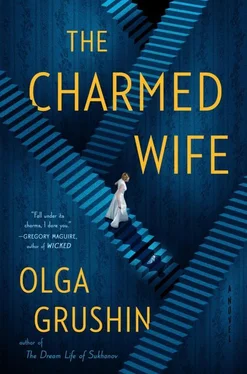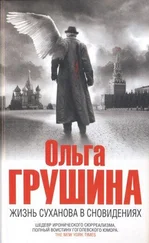She finishes the last of her coffee, worries the wedding band on her finger.
“Just dreams,” she says. “Just dreams, I know. To be honest, it’s probably all those miscarriages I had, before the girls. But sometimes I can’t help wondering—”
And it is then that the doorbell rings.
And since Melissa appears distraught, it is I who stand up to answer.
The short, unshaven man in a cheap brown suit who shifts from foot to foot on the threshold is a stranger, and yet, surprisingly, he offers me my name.
“Are you?” he asks.
“Yes,” I reply, a bit experimentally (am I?), and shrink from the swift mirthless smirk that twists his loose, rubbery lips.
“You are served,” he croons, thrusts a manila envelope into my hands, and disappears abruptly, as if he had never been there at all.
“Who was that?” Melissa asks from the kitchen table.
I extract a thick sheaf of papers from the envelope.
“Complaint for Absolute Divorce,” the black-on-white letters state at the top.
Dully, I leaf through the pages, and out of their stark whiteness words explode like a mob of angry crows startled out of a tree, flying into my face, scratching at my eyes. “Abandonment,” “child neglect,” “unemployed,” “erratic behavior,” “long-term abuse of prescription medications,” “history of mental instability,” “lived in a rodent-infested room,” “unsuited for taking care of,” “no residence of her own,” “is currently cohabitating with her brother-in-law, Thomas Woodley, in an adulterous arrangement,” “recent evidence of alcohol and drug use (see Exhibit A)”… A photograph flutters out. It is blurry, but I can make out myself, in crumpled clothes, with a crumpled face, stumbling raccoon-eyed and windblown through the neighborhood park at dawn, hugging a bucket with a burnt hydrangea to my chest.
The next page delivers the execution order: “… hereby request full custody of the minor children, Angelina and Roland the Sixth…”
Slowly I sink onto a chair, the pages falling from my loosened hands. My heart is like a plague bell tolling in my chest, and my chest is empty, my mind is empty. It’s over, I think, and maybe I say it aloud. Bustling, scowling, Melissa gathers the scattered pages, licks her index finger, begins to turn them, begins to exclaim, my supporting cast intoning the scripted lines of indignation.
“But this is outrageous,” she fumes. “These are all lies!”
Are they, though? I myself am not overly sure.
Some of it might be true.
“Call your lawyer,” she says, slamming the papers on the table, slamming her fist on the papers. “This makes me furious. I can’t even imagine how you feel.”
Furious, yes. But also—mainly—frightened: for this blow has split open a never fully healed scar, and out of the gaping wound has gushed my constant guilt over not being enough for my children in recent years, perhaps never having been enough, of failing as a mother in so many ways, of clearly, sickeningly, not being as perfect as fairy-tale princesses are expected to be. And as I sit there, frozen by horror, watching the lifeblood pouring out of my heart, all I can think is: Will I now pay for all my faults, my all-too-human weaknesses, by losing them forever, by forfeiting what I love most?
But already, somehow, the telephone is set before me, and Melissa is searching for the number, and I watch the round dial jerk forward and fall back, jerk forward and fall back. And next Gwendolyn’s efficient voice is in my ear, and then I am in Gwendolyn’s efficient office, and she is telling me we will fight him, king or no king, we will level our own accusations, will prove that I can take care of myself and my offspring, will establish my character, will end by making me a free woman, and a rich free woman at that, here is what I need to do, this, this, and now this—and so I read through this document, and sign here, and authorize that statement, and sign there, and then things speed up, everything slides by so quickly, my tearful farewell to Melissa, Tom, and their girls (“But we are only a short train ride away, we are here for you”), a tiny apartment I have found for rent in the city, my weekly sessions with Dr. Wand, which are beneficial as a matter of record, a string of new employment opportunities (following upon the termination of my contract with the young women of questionable values out on Long Island, who may have proved detrimental to my case), my work taking me out of the city and back to the suburbs, though more affluent than my sister’s by far, where I assist beautifully coiffed wives, their short ballooning skirts clenching their wasplike waists, with baking cakes, ironing sheets, and vacuuming wall-to-wall carpets.
I follow my lawyer’s strict injunctions not to fraternize with my employers this time, but I watch them closely, for doing so distracts me from dwelling on my own misery. The wives move as though under water, with their immaculately manicured pearly nails and their dainty kitten heels, and at midday their eyes assume a mild glassiness, a bit like the eyes of the fancy dolls in their daughters’ rooms. I never meet the husbands (in the city during the day, the wives inform me, at work in their advertising agencies or banks or investment firms), or the children, either (I am not told where the children are), though I am presented with the evidence of their existence in countless prominently displayed pictures. In the pictures, everyone is always smiling, seated over checkered tablecloths at picnics, posing in mid-jump with tennis rackets, lined up by lakes with fishing rods. The husbands’ smiles seem offhand and the wives’ faintly hysterical, yet the children look sincere, even eager. After a while, as weeks pass and I never see any of the children in the gleaming rooms of these gleaming homes, I fall to wondering whether the wives have not contrived to trap their darling boys and girls inside these framed displays of ideal childhoods and are thus keeping them safely out of the way while they themselves, ever so slightly sedated, navigate the troubled shoals of their marital havens.
Because I can recognize unhappy women when I see them, and these women are unhappy.
They long to talk to me. They act all frosty at first, for the instructional articles they favor in the Good Housekeeping magazine have advised them to keep their distance from their help; yet after a while—weeks in some cases, mere days in others—they feel reassured by the fact that I have not made any requests for monetary advances, nor have their precious candlesticks or silver spoons gone missing, so they begin to linger in doorways of dining rooms while I dust their displayed wedding china, and they chat about this and that, and then, at the end of my day, invite me to partake in cups of tea, relaxing pills, and confessions. I take no pills, share no confessions of my own in return, and offer little encouragement, but little is all that is needed, it seems, and I hear their stories. And perhaps the stories I hear are not precisely the stories they tell, but by now I know enough about love and princes to discern, behind the cheery inflections of their genteel fantasies, beneath the cherry veneer of their civilized mid-century dwellings, the dark, heady danger of primitive transformations, the rank odors of beasts prowling through the woods.
There are five of them, one for each day of my working week. The Monday princess, the oldest and most resigned of the lot, met her husband when she was out for a stroll in the park, gathering flowers for her parents’ mantelpiece arrangement, and he a stag pursued by a vicious hunt. He bounded over for help, pleaded with her to give him her heart, for only thus would the enchantment be broken, only thus would he resume his true, his human, form, and she felt sorry for him because of the frantic rolling of his golden eyes, the foaming of his blackened lips, and chose to believe him. And once her heart was firmly in his possession, he did make one fine-looking, graceful man; but these days, almost two decades later, she often finds her ceilings scuffed by antlers and her rugs imprinted by hooves, so she has begun to suspect that he lied to her, is lying to her still, that his true form has always been that of a stag and he gladly reverts to his prancing, doe-chasing ways whenever her back is turned, then pretends to misunderstand her tired questions in the mornings—and three or four times now, she has stumbled upon her heart, once his greatest treasure (he said), lying forgotten on windowsills or in kitchen drawers.
Читать дальше












